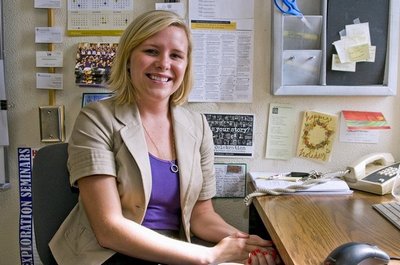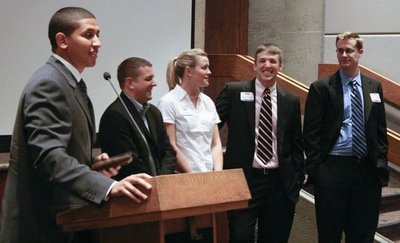Jenee Myers Twitchell plays several roles on campus, and likes it best when those roles intersect — when her worlds collide.
Engaging and well-spoken, Myers Twitchell, 27, is clearly a leader in the making, and a busy one at that. She’s a staff undergraduate adviser for the relatively new minor in Education, Learning and Society offered jointly by the College of Education and College of Arts and Sciences, and a doctoral student herself in the college’s division of Educational Leadership and Policy Studies.
Just as important, she is a co-founder of The Dream Project, an innovative, still-growing program that helps high school students imagine and achieve a college future at the UW.
“I think of leadership as bringing pieces together,” Myers Twitchell said as she talked about her life and work on a recent afternoon in her small Padelford Hall office. “Bringing ideas or people or issues to the table and helping people figure them out … making sure the right people are at the table to figure out the problems.”
The Dream arose in part from Myers Twitchell’s own experience being the first in her Yakima farming family to attend college, and her feel for the difficulties such students can have accessing higher education.
“Not a lot of people leave Yakima from my family,” she said. But she was fortunate enough to have college-bound friends and “a couple of aunts who helped me think about the process.” She added that it can be “harrowing” to apply for a four-year school, especially if you come from a family of limited means.
Backed by strong grades and a helpful high school counselor, Myers Twitchell applied for the UW and in 2000 was awarded the full-tuition Alumnae Board Scholarship. She earned her bachelor’s degree in comparative religion from the Jackson School of International Studies.
She was a senior when she and her future husband Grant Twitchell (also now a graduate student in education) befriended a fellow undergraduate named Alula Asfaw, who is from East Africa and is also the first in his family to attend college. “To make a long story short, we ended up talking at Schultzy’s on the Ave. for about five hours and came up with this idea for the Dream Project.” Asfaw had been considering the idea for some time, she said, working with Stan Chernicoff, a geology professor who is now the project’s faculty adviser.
“The main mission of the Dream Project,” Myers Twitchell said, “is to partner undergraduates at the UW with local high school students who are the first in their family to go college, low-income or underrepresented in some way.” The program focuses on area high schools “that are traditionally underfunded — some have been called the dropout factories of Washington State.” The college students meet with the high school student weekly during their junior and senior year, helping them with all manner of college preparation. The program started small, she said, but as of next year expects to partner about 300 undergraduates with 700-some high school students.
“So many high schools are frustrated with programs that come in and can only serve 35 to 40 students and can only take the ones that have 3.0 GPAs. We’re looking to literally help the entire junior and senior class — or all the students who have come in the high school — to go to college.” She repeated for emphasis: “All.”
Myers Twitchell said she took a couple of years off school after getting her BA, but stayed working with the Dream Project. In this time, she said, she realized that connecting students with educational opportunities was a professional passion for her, and this guided, and continues to guide, her later work.
So she returned to school to pursue a master’s and doctorate in Educational Leadership and Policy Studies, but still needed a job. She heard that the College of Education had started a minor in Education, Learning and Society, inquired of UW education colleagues and — another long story made short — got the job. She is now in her second year of the doctoral program.
This role, too, complements the others nicely. “What’s really neat is that I get to use this position — my advising role — to recruit really diverse students for our graduate programs like our Masters in Teaching. And I get to pull from this other population I’ve already worked with for the Dream Project.”
As if all this were not enough, Myers Twitchell also serves on a committee for student recruitment and retention in the College of Education, and on the Mary Gates Scholarship Committee.
Myers Twitchell is the recipient of the College of Education’s 2010 Graduate Leadership Award for her own efforts. Meredith Honig, her doctoral adviser, also offered praise, saying, Myers Twitchell is “just the type of student” she came to the UW to work with — “Jenee is a great example of the kind of student I find here,” passionately committed both to relevant research and practice, “and aspiring to a career that makes a difference by working between the two.”
Ed Taylor, vice provost and dean of undergraduate affairs, who was helpful in recommending her for the advising job, wrote in an e-mail that Myers Twitchell is “a talented and devoted young woman who has accomplished a great deal in a very short time” at the UW.
Taylor wrote, “What’s remarkable to me is not just what she has done here, it is how she has served and led in her multiple roles at UW. Jenee leads and does so with compassion, intelligence and a true dedication to collaboration and the common good. …Jenee has cofounded an academic program that has become nationally recognized. She has stimulated the undergraduate minor and has, early in her tenure as a graduate student, received recognition in the college for her exceptional leadership.” He added, “To think — she has only just begun.”
Myers Twitchell is modest amid all this talk of leadership. She said, smiling, “I think the thing I’ve honed the best over the last three of four years that has people saying I am a leader — is just bugging people to get them all to talk. So if that’s what you want to call a leader, then that’s what I’ve gotten good at.”
She said she’s not terribly good at on-the-spot eloquence. “There are people in the Dream Project and in my world who are better at that.” Perhaps she’s thinking of Asfaw, who she joined in establishing the Dream Project in 2005. She said the two agreed back then that luck, and having a few helpful friends and relatives, made a huge difference in their lives.
“Had those one or two key people in our lives not been there, neither of us would have been friends at the UW, sitting together at Schultzy’s on the Ave.,” she said. “And so — I think we were worried that it shouldn’t be about luck.”

